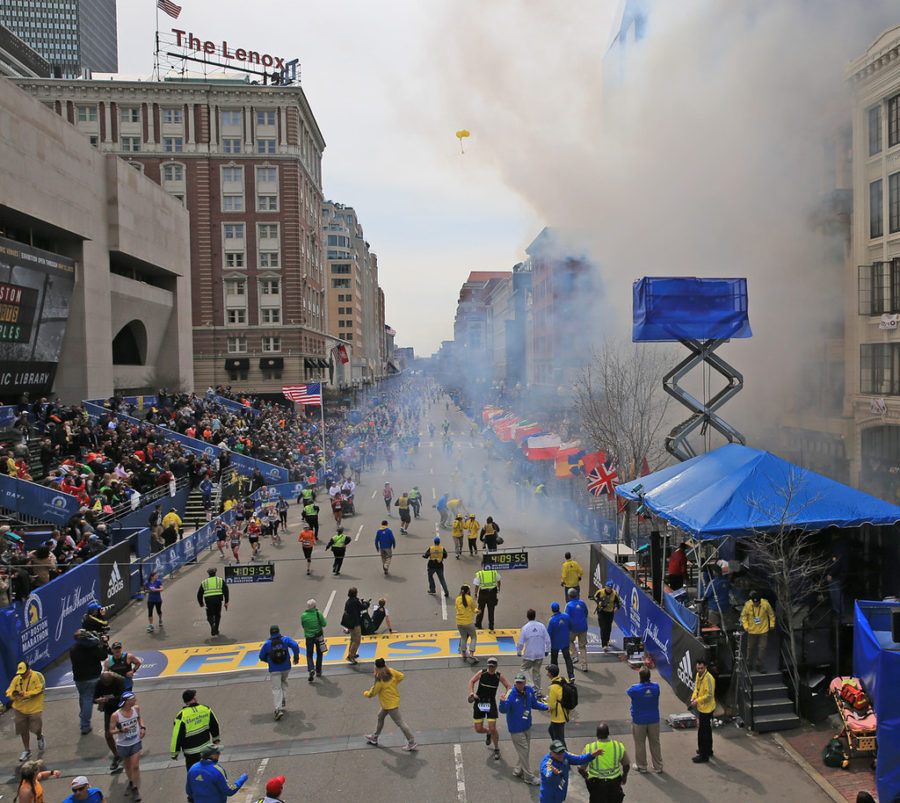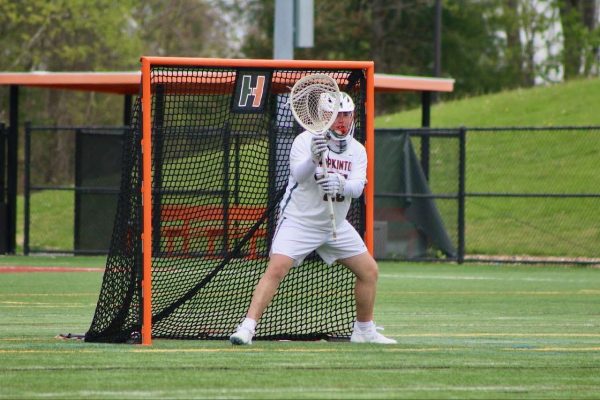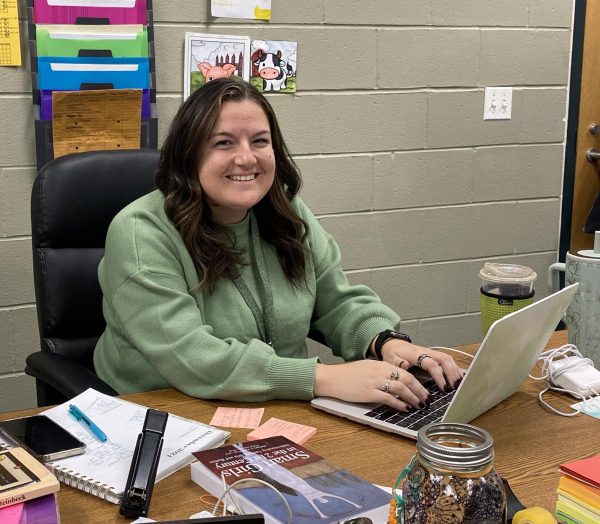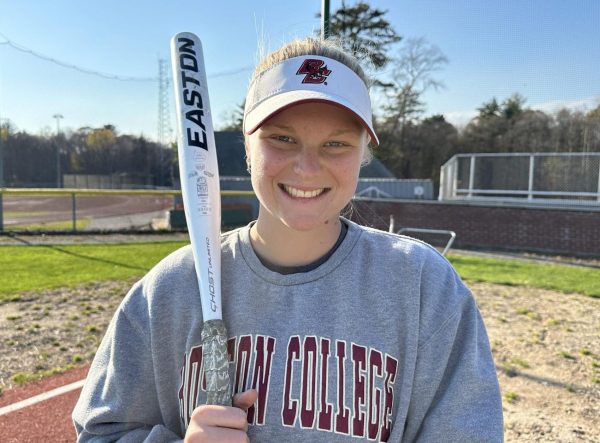Boston Strong: Remembering the Stories of the Bombings 10 Years Later
“KRON 4 Coverage of the Boston Marathon Bombings” by A Name Like Shields Can Make You Defensive is licensed under CC BY 2.0. To view a copy of this license, visit https://creativecommons.org/licenses/by/2.0/?
On April 15, 2013, 26,839 runners lined up at the start line in Hopkinton for the 117th annual Boston Marathon. Although quite chilly for the spectators, the 50-degree sunny day was described by some runners as the perfect running weather.
Nobody could’ve expected the tragedy that would soon occur. Shortly before 3 pm, two bombs exploded about 12 seconds apart near the finish line, killing three and affecting the lives of many.
As the 10th anniversary of the bombings approaches we remember the stories of the survivors and mourn those who lost their lives.
In 2013 Ann Michele Dragsbaek, a local business owner and mother of four, was getting ready to run her 7th Boston Marathon.
“At the time, I owned a salon downtown right next to the Hopkinton Police Station. After I ate breakfast, I headed up there early to wait in my salon,” Dragsbaek said.
“The weather was perfect, it was sunny and I had shorts and long sleeves on.”
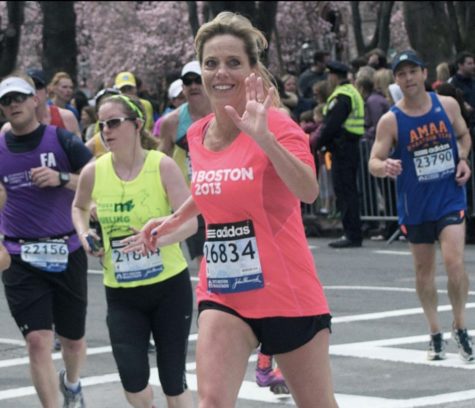
When Dragsbaek crossed the finish line, the clock above the finish line read 4:07:18. At 4:09:43, she stood on the finish line as the first bomb exploded.
“When the first bomb went off, I was reaching for a bottle of water. The volunteer dropped it and said ‘That wasn’t supposed to happen’, ” Dragsbaek said.
“My first thought was that a plane had crashed cause I could see smoke but then I thought that’s not possible.”
“I turned around and saw a lady volunteering that I knew from Hopkinton. I asked her ‘What was that?’ Even though I knew it was a bomb at that point, I was just in shock and wanted her to tell me it wasn’t.”
“Some guy started crying saying ‘Those people, they are all gone’ and other people started screaming that it was a terrorist attack. I started to panic and asked people to borrow their phones but the phones weren’t working,” Dragsbaek said.
“I thought my family was dead, I kept pleading with the world that if they were ok, I would never run ever again and kept thinking that if it wasn’t for me they wouldn’t have been there.”
As runners stood on the road unsure where to go next, those on the sidewalk were running.
“On the sidewalk, people were running like a pack of elephants away from the bombs. There were barriers so people weren’t on the road with us but I could see them.”
Due to the lack of information at the time, lots of rumors were tossed around. Some said there were bombs in the subway, and others said there was one in the stands.
“I was afraid to step anywhere because I thought more bombs were going to go off. After the second bomb had gone off, we thought they were everywhere,” Dragsbaek said.
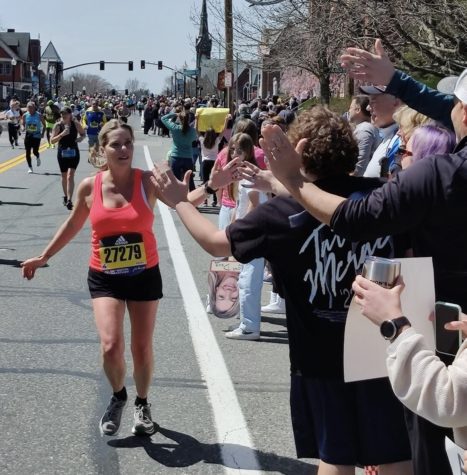
In her panic, Dragsbaek walked towards the family meeting area where she was supposed to meet her family. She stood on the steps of Grill 23 freezing as the police screamed at people to keep moving.
“Grill 23 had locked everyone out. I was standing outside freezing and someone gave me a poncho to keep me warm. I was there when my husband found me and we both just started crying and hugging. A random woman came up to us and started crying and hugging us too.”
Even after her traumatic experience, Dragsbaek had no doubt she wanted to run again.
“I only had reservations about running it again, the day of the bombing. Once everything had settled and my family was safe, I realized I wasn’t going to let them stop me from running.”
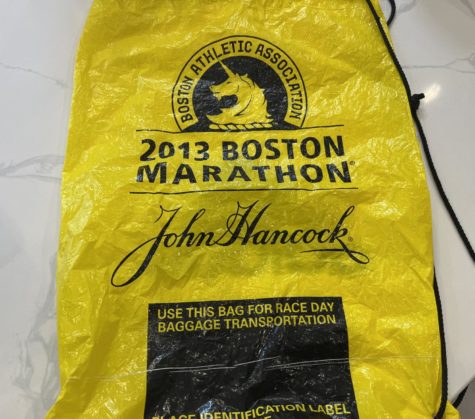
Since 2013, Dragsbaek has run 9 more Boston Marathons and is gearing up for her 17th this April.
For Brendan Rickert, a member of the Hopkinton Running Club, the 2013 Boston Marathon was his first marathon. He ran for a non-profit, filling in for a runner that had dropped out in January. Not living in the area at the time, his day started early.
“I took the commuter rail into Boston, I believe it was the 5 am train into Back Bay. I walked over to the Boston Common and got in line to get the bus to Hopkinton,” Rickert said.
“From there I took the seemingly very long bus ride to Hopkinton as the sun came up and got to Athletes Village at Hopkinton High School.”
“It was an absolutely beautiful morning, perfect running conditions. Everyone was excited and ready to run. I ate my breakfast in one of the tents, kept hydrating and when it was my time to line up, I made my way down towards the start line ready to make my way back to Boston.”
Rickert ran in the third wave, which started closer to the middle of the day. He breezed through the first half of the race before running into issues.
“Like anyone running their first marathon, the first half felt easy. Things were clicking well, the weather was absolutely perfect and of course, I started to run faster than I should have,” Rickert said. By the time I hit the Newton Hills, the wheels started falling off. I had to alternate running and walking from mile 18 to the finish. My legs started to cramp and I couldn’t run much more than 2 to 3 minutes at a time.”
During Rickert’s distress, he noticed the way his competitors began to help him and encourage him to keep going.
“Some would stop and ask if I was ok, [and] others would encourage me to start to run with them for as long as I could. The crowd kept encouraging me to run and cheered when I would get back to it,” Rickert said. “It was the most amazing thing I’ve experienced running.”
Rickert finished the race approximately 55 min before the first bomb exploded and was two blocks away when he heard it explode.
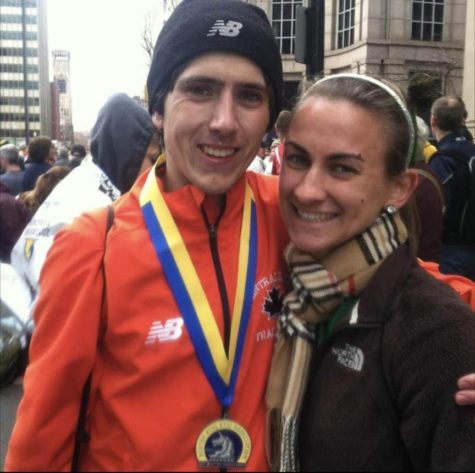
“Because we weren’t right there and down a side street it sounded more like something fell from a construction site.”
“Everyone around us all stopped talking and then about 20 seconds later when the second bomb went off it sounded more like an explosion and you could see in everyone’s faces that it didn’t sound right,” Rickert said.
At the time, Rickert was headed back to Back Bay station to catch the commuter rail out of the city so he and his family continued on but by the time he got there, he knew something wasn’t right.
“I distinctly remember two officers with bomb sniffing dogs walking into the station with a very serious look on their face.”
Because of the disruption to the cell service, Rickert couldn’t answer any texts or calls or access his phone for information about the bombings.
“When we were finally able to get on the train, one of the last ones out of the city, one of the passengers was able to get service and confirmed the two explosions,” Rickert said.
“He showed some graphic photos that were on the website and I just remember being upset and scared.”
Despite the trauma he endured, Rickert didn’t let the bombings stop his future marathon endeavors. He ran in 2015, 2016, and is running again this year.
“I’m 100% running again in the future. David Ortiz said it best ‘This is our f***ing city. And nobody’s gonna dictate our freedom. Stay strong,’ ” Rickert said.
Andrew Longoria, a teacher at Hopkinton High School, had just rounded the corner of Boylston St when he saw the first bomb go off.
“I saw the first bomb go off in the distance. I kept running and a few moments later, the second bomb went off just to my left,” Longoria said. “I was only able to take a few more steps before a police officer jumped out into the running field and yelled at everyone to get down.”
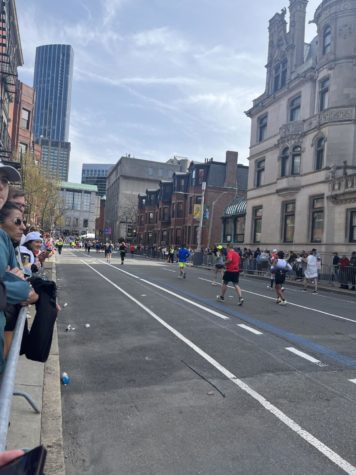
After processing what had occurred, Longoria immediately thought about his family.
“What was most concerning to me was where the second bomb was, [and it] was where my family has been typically waiting for me so I was really worried.”
“I immediately got out my phone and called my wife but got no answer. Then I started to walk around trying to find them but I couldn’t see them. Finally, my wife called me back and we met at the family meeting area,” Longoria said.
By the time Longoria had met up with family the phone service had been disrupted so, he headed back to his car and drove out of the city.
“By the time we got to 495, we were able to get phone service and I was flooded with calls from friends and family,” Longoria said.
“People were tracking me and saw that I should’ve been there around the same time the bombs went off and they were worried.”
In the week that followed the bombings, Longoria was stuck watching the TV and could barely concentrate on work.
“I was pretty traumatized, when you get towards the finish line after all the training and hard work and see the end snatched from you, it was pretty tough but to know all the tragedy that had happened was even more upsetting,” Longoria said.
As Longoria gets ready to run his 10th and last Boston Marathon this year, he keeps with him the memories of the day but doesn’t let the bombings stop his passion for running.
Longoria was one of the more than 5,700 runners that didn’t get to finish the marathon.
To commemorate people like him who weren’t able to finish the 2013 Boston Marathon, the BAA sent out finishing medals to everyone who ran. They also opened up the opportunity for runners to run in 2014 without having to fundraise. Both Longoria and Dragsbaek took advantage of the opportunity to run for free in 2014.
Runners like Dragsbaek, Rickert, and Longoria didn’t let the bombings take away their passion for running, instead, they persevered and ran again in the years following, embodying the Boston Strong slogan and showing the bombers that they can never break the unity of our city.

